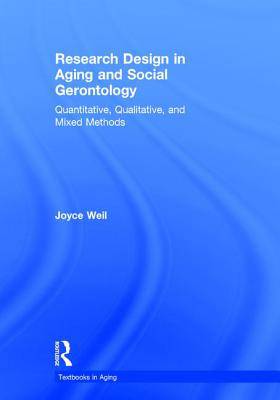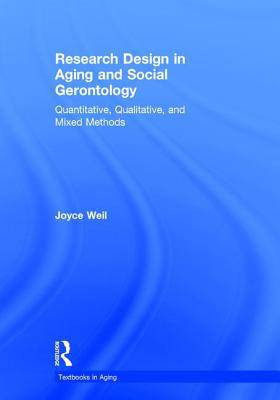
- Retrait gratuit dans votre magasin Club
- 7.000.000 titres dans notre catalogue
- Payer en toute sécurité
- Toujours un magasin près de chez vous
- Retrait gratuit dans votre magasin Club
- 7.000.000 titres dans notre catalogue
- Payer en toute sécurité
- Toujours un magasin près de chez vous
Research Design in Aging and Social Gerontology
Quantitative, Qualitative, and Mixed Methods
Joyce WeilDescription
Research Design in Aging and Social Gerontology provides a review of methodological approaches and data-collection methods commonly used with older adults in real-life settings. It addresses the role of normative age-related sensory, cognitive, and functional changes, as well as the influence of generational cohort (age-period-cohort) upon each design. It discusses the role of older adults as true co-researchers; issues uniquely related to studies of persons residing in community-based, assisted, skilled, and memory-care settings; and ethical concerns related to cognitive status changes. The text concludes with detailed guidelines for improving existing data collection methods for older persons and selecting the best fitting methodologies for use in planning research on aging.
Features of Research Design in Aging and Social Gerontology include:
- Descriptions and evaluations of a wide range of methodological approaches, and methods used to collect data about older persons (quantitative, qualitative, mixed, and emergent methods: photovoice, virtual environments, etc.)
- Ways to match research questions to selection of method without a preconceived methodological preference or dominance
- Real-world and applied examples along with cases from the gerontological literature
- "How to" sections about reading output/software reports and qualitative-analysis screenshots (from ATLAS.ti) and quantitative (SPSS) output and interpretation
- Pedagogical tools in every chapter such as text boxes, case studies, definitions of key terms, discussion questions, and references for further reading on chapter topics
- Glossary of key terms, complete sample research report, and an overview of past methodological research design work in gerontology
- Companion website at www.routledge.com/cw/Weil where instructors will find PowerPoint presentations, additional discussion questions, and a sample syllabus; and students will find flashcards based on glossary terms, a downloadable copy of the sample research report in the text, and links to data sets, related websites, further reading, and select gerontological journals
This text is intended for upper-level undergraduates and masters students in aging and gerontology as well as students in human development, applied anthropology, psychology, public health, sociology, and social-work settings. Health care professionals, social workers, and care managers who work with older adults will also find this text a valuable resource.
Spécifications
Parties prenantes
- Auteur(s) :
- Editeur:
Contenu
- Nombre de pages :
- 302
- Langue:
- Anglais
- Collection :
Caractéristiques
- EAN:
- 9781138690257
- Date de parution :
- 16-03-17
- Format:
- Livre relié
- Format numérique:
- Genaaid
- Dimensions :
- 178 mm x 254 mm
- Poids :
- 747 g







